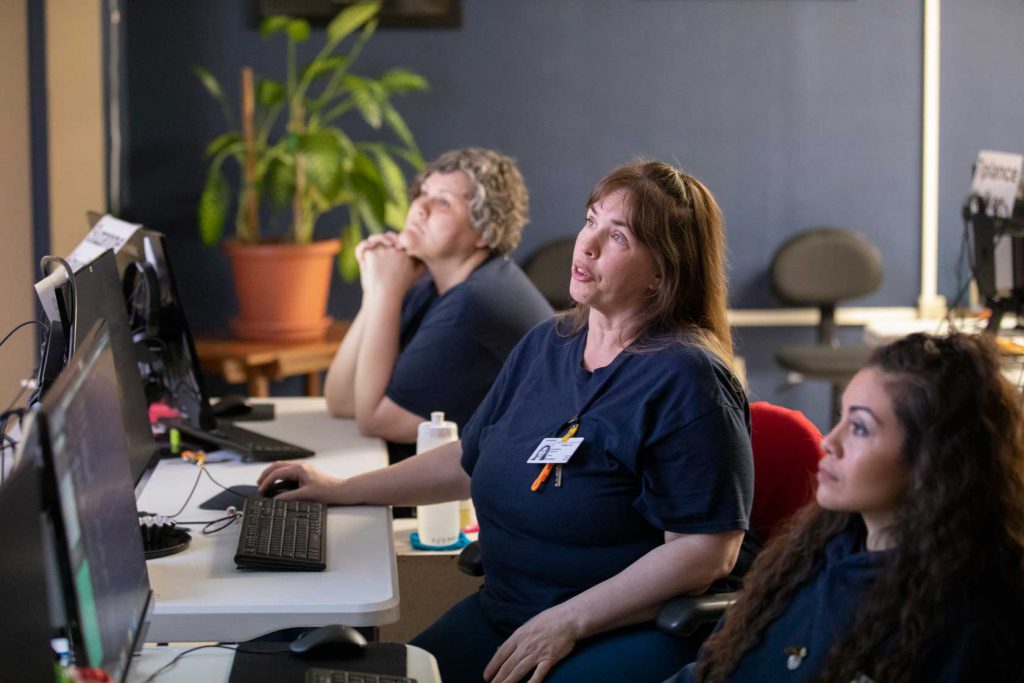Article
‘Smart…industrious – they just took a wrong path’
Feb 8, 2020
Co-founder of The Last Mile talks about discovering potential behind bars – and how Kansas became one of the…
Feb 8, 2020
Co-founder of The Last Mile talks about discovering potential behind bars – and how Kansas became one of the…
Co-founder of The Last Mile talks about discovering potential behind bars – and how Kansas became one of the first expansion locations
When a friend invited Silicon Valley venture capitalist Chris Redlitz to come to San Quentin to talk to inmates about entrepreneurship in 2010, he almost said ‘no.’
But what he found inside the prison about 30 miles north of San Francisco surprised him.

“I was really struck by their interest, their preparation, their genuine desire to create a better life,” Redlitz said.
He was used to working with entrepreneurs in the early stages of developing their businesses.
“I saw a lot of the same look in the people in prison,” he said. “Many of them are very smart and industrious. They just took a wrong path.”
Redlitz and his wife, Beverly Parenti, made a commitment to assist some of the inmates with their ventures, and out of that grew The Last Mile, a non-profit organization offering coding and technology training to inmates in prisons around the U.S.
Since its launch in 2010, The Last Mile is now being used in fifteen prisons in five states and has 19 classrooms in those prisons.
“We’d love to be in 50 classrooms,” Redlitz said.
Kansas was among the earliest states to embrace the program, launching it at Topeka Correctional Facility in January 2019. Women’s prisons in Indiana and Oklahoma are utilizing The Last Mile as well.
“So far, it’s been phenomenally successful,” Redlitz said. “This idea of public/private partnerships, we’re a classic example of that.
“We’re proving that, regardless of someone’s background, if they have the desire and commitment to learning, they can be great employees. We’re showing that it’s not unrealistic to raise the bar on expectations.
It really is a true pathway to employment. It’s a second chance.”
The impact stretches far beyond providing work for inmates, Redlitz said. Coding can be a well-paying career, creating “generational change,” he said.
That can lift families out of poverty and reduce the risk of parolees returning to a life of crime.
“The money we’re saving through the reduction of recidivism can be redirected” to other programs,” he said.
“You can’t quantify the downstream effect of what one person can bring to their community,” he said. “We’re seeing it in our own graduates and the directions of their families.”
“We’re proving that, regardless of someone’s background, if they have the desire and commitment to learning, they can be great employees. We’re showing that it’s not unrealistic to raise the bar on expectations.
It really is a true pathway to employment. It’s a second chance.”
Chris Redlitz, Venture Capitalist, Co-founder The Last Mile
The graduates also bring diversity to Silicon Valley companies and tech companies elsewhere at a time when the industry is awakening to that need, Redlitz said.
Making adjustments to the product as it’s tested are part of any start-up, he said, and The Last Mile was no exception. The program has evolved a lot since its early days and students have had to adapt to the changes.
“I give Kansas students a lot of credit,” Redlitz said. “Whenever you’re early on, you have to be flexible.”

The students at Topeka have adapted well as the program has evolved, he said. Recent additions include a live touchpoint with each class once a week and a live help desk to which a student can submit questions.
“Some of the best-performing students in our entire network are in Kansas,” Redlitz said.
Redlitz credits Harold Sass, chief information officer for the Kansas Department of Corrections, with being a driving force behind bringing The Last Mile to Topeka.
“He was very, very motivated to get the program going” in Kansas, Redlitz said.
Prisoners in Topeka coding a brighter future for themselves
Sass attended an event hosted by The Last Mile to spread the word about the program and came away impressed.
The Kansas Department of Corrections found The Last Mile appealing because research shows that offenders who achieve livable wage employment after release lower their recidivism by 6 to 22 percent, said Rebecca Witte, public information officer for KDOC.
“We have many partners across the state who help us train our inmates in a number of different fields, but The Last Mile has been able to provide us with our first computer coding program,” Witte said. “One of the industries vital to a strong Kansas economy is computer science” and that field has critical employment needs.
“Training returning offenders in this industry increases their ability to achieve sustained livable wage employment,” she said.
Coding jobs aren’t minimum wage, earn-just-enough-to-get-by jobs, either, officials say, which means former inmates have an opportunity to build a better financial future for themselves and their families.
“One of the industries vital to a strong Kansas economy is computer science.”
Rebecca Witte, Public Information Officer, Kansas Department of Corrections
“The coding program has been a good investment,” Witte said. “None of the students in our first class had any experience with computer coding and the instructors were patient and flexible with our students, as they were eager to learn.”
As other inmates have seen what those in the coding class have been able to accomplish, interest in the class has grown. About twice as many inmates applied to take part in the second coding class as the first, officials said.